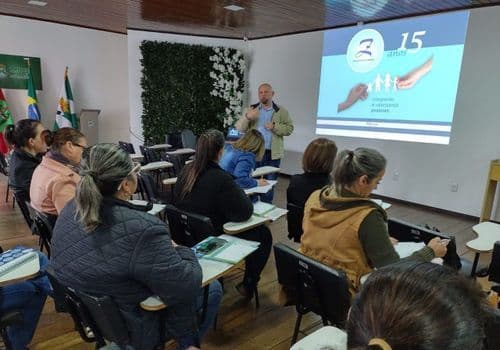
29/11/2022
Circular Movement in Santa Catarina schools
The impact of Circular Economy through education and culture within a local context is capable of transforming the community. And the best thing is to see this transformation happen in partnership, like the one we signed in 2022 with the Francesco Zomer Institute (IFZ).
The social branch of FCO Group, a packaging solution company, has been carrying out free sociocultural work for over 15 years in the city of Orleans (SC), where the company's headquarters are located.
"It is an institution that offers its community the teaching of music, dance and professional education; a work developed in a serious manner for the local community", describes the coordinator of the Circular Movement, Vinicius Saraceni.
It was through it that, in Orleans - and afterwards in the neighboring Lauro Muller community -, that ideas and projects for sustainability were born and put into practice starting from the pedagogical contents of the Circular Movement and from the involvement of the Institute with the local community, having as a starting point, besides the institute itself, the city’s schools.
Are we going to find out more about the fruits of this partnership?
From classrooms to the community
The first step taken by the Francesco Zomer Institute was to plan a front for information activities at the school units in Orleans.
In meetings with directors and teachers, the Institute's team presented the educational platform of the Circular Movement, showing how to access and explore the content.
From then on, the teaching staff was ready to work in the classroom. The director and treasurer of the IFZ, Marcelo Lole, offers more details of this dynamic:
"Students begin by learning the basic concepts of the Circular Economy through the educational content in the Movement platform. Afterwards, spaces are created for reflection, discussion and the creation of project proposals, bringing together the entire school community. And so, with the supervision of the Institute, the projects can go into practice in the day to day life of the city".
Have a look at what is already working with the project in this partnership with the IFZ in schools:
At the Costa Carneiro School of Basic Education, students collect plastic caps that are sold to a recycling company. The funds are donated to an NGO that supports the city’s abandoned animals.
The Unibave School has the "Ecos" project that collects plastic caps and can seals for the purchase of wheelchairs.
Samuel Sandrini School of Basic Education has created a project for the reuse of recyclable materials developed by teachers and pupils in elementary education.
In addition to carrying out a recycling and composting project, Ser Educação Infantil School promotes the awareness of local public authorities for the enactment of public policies aligned with the selective collection of waste.
And the Lauro Pacheco dos Reis School of Basic Education carries out activities related to recycling, such as the separation of dry and organic waste in the school and neighborhood trash bins where it is located.
Pretty cool, huh? "These school units are currently impacting more than 1,300 people through their sustainable actions, helping to make the Circular Economy increasingly present in the daily lives of families as well", Lole tells us.
Movement also in Lauro Muller´s Schools

The Francesco Zomer Institute also managed to expand Orleans' project to the schools of Lauro Muller, a nearby town.
In September, the partnership between the Movement and the IFZ with the schools of Lauro Muller was formalized in the city hall of the municipality, with the participation of directors and the team of the Education Board. There was an online lecture by the pedagogical coordinator of the Circular Movement, Professor Dr. Edson Grandisoli and the teachers were able to know, discuss and reflect on Circular Economy and the contents of the Movement platform.
"The partnership signed between the institute and the schools in the municipality of Lauro Müller with the Circular Movement will expand and strengthen a network of action and cooperation in the transformation of the linear economy into circular economy, or that is to say, a sustainable format'', believes Marcelo Lole.
Art for circularity
Besides the action with the schools, within the IFZ, the pedagogical team is looking to bring the content of the Circular Movement also to the day-to-day of the music, dance and professional training courses that have already been offered to more than 6,000 students, since its foundation in 2007.
Art and circularity have everything to do with it. That's what Lole believes. "Art provides the capacity to appreciate the beautiful, and to do good, this justifies the connection of our projects with the Circular Economy that dialogs with all ludically educational spheres", the institute's treasurer justifies.
What is the circular economy?
The Circular Economy proposes a new look at our way of producing, consuming, and disposing, in order to optimize the planet's resources and generate less and less waste. In other words, an alternative model to the Linear Economy - to extract, produce, use and discard - which has proved to be increasingly unsustainable throughout history. In the Circular Economy, the goal is to keep materials in circulation longer by reusing them until nothing becomes waste! For this model to become a reality, we all have a role to play. It is a true collaborative circle, which feeds itself, and helps to regenerate the planet and our relations.
Learn about Circular Economy
If you are interested in learning more about this topic, visit Circular Academy, the first free Latin American course on circular economy aimed at general audiences. All of us, in partnership and collaboration, can make a difference in building a more circular planet.

